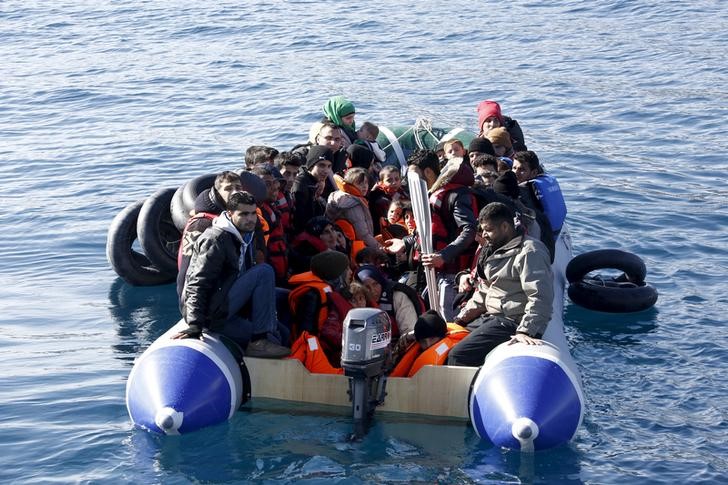By Gabriela Baczynska
BRUSSELS (Reuters) - The EU executive will push Greece and Italy on Wednesday to do more to control migrants arriving across the Mediterranean, as time runs out for Athens to fix frontier chaos or be suspended from Europe's free travel zone.
EU leaders will meet next week under growing pressure to get the migration crisis under control before warmer spring weather encourages a surge of new arrivals.
More than a million people reached Europe last year, putting pressure on security and social systems in some EU states and exposing deep rifts within the 28-nation bloc.
"If half of the decisions and resolutions that have been taken by the European Union last year had been implemented, the situation now would be much better," William Spindler, a spokesman for the U.N. Refugee Agency UNHCR, said on Tuesday.
"The mechanisms are already there, decisions have been taken, ... countries have taken commitments, but unfortunately many European countries are not living up to their commitments. They need to be doing more, they need to be doing what they agreed to do."
Most people from the Middle East and Africa reach Europe via Greece and Italy. Both countries, still recovering from the euro debt crisis, have come under increasing criticism from elsewhere in the bloc for failing to properly manage the flow of people into the Schengen zone of passport-free travel.
Greece and Italy say the numbers are too big to control.
The European Commission will adopt "progress reports" on Wednesday, ready for the summit on Feb. 18-19, an EU official said.
One issue centres around Greece and Italy setting up "hotspot" sites to screen arrivals. European Migration Commissioner Dimitris Avramopoulos, who is due to present the Commission's stance on Wednesday, discussed the idea on Tuesday with Greece's Defence Minister Panos Kammenos.
A picture posted by Avramopoulos showed the two men laughing but the atmosphere may be more sombre on Wednesday when the Commission will also discuss border recommendations for Greece that would eventually allow for the extension of temporary emergency border checks that Germany and other EU states introduced inside the Schengen area and that expire in May.
If and when 28 EU states approve the recommendations, Athens would have three months to fix deficiencies or else the Schengen zone could be suspended for up to two years.
The Commission will also look on Wednesday at where the bloc stands on setting up a 3 billion euro fund for Turkey in exchange for Ankara curbing the numbers of those heading on to Europe.
One diplomat said part of the discussion at the EU summit in Brussels next week will also be how to help Greece fix what Brussels had described as border "neglect", but not "stigmatise" Athens.
Draft conclusions so far suggest no quick solution is in sight, with the leaders expected to stress that migrant flows from Turkey remain "much too high", according to the document obtained by Reuters. They would also note progress by Greece and Italy but highlight that "much remains to be done", it said.
